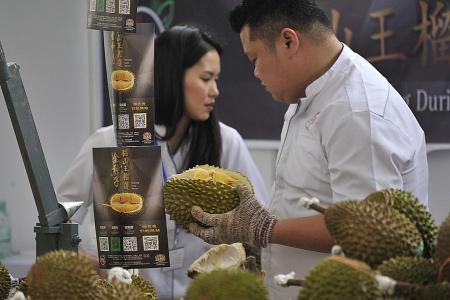Durian set to become Malaysia’s next major export: Report
Demand from China sparking large-scale investment in durian farms
KUALA LUMPUR: The durian is set to become Malaysia's next major export as it rushes to develop thousands of acres to cash in on unprecedented demand for the fruit from China.
Once planted in family orchards and small-scale farms, the durian is attracting investments like never before.
Even property tycoons and companies in palm oil, Malaysia's biggest agricultural export, are making forays into the durian business.
The Malaysian government is encouraging large-scale durian farming, counting on a 50 per cent jump in exports by 2030.
"The durian industry is transforming from local to global large-scale farming due to the great demand from China," said Mr Lim Chin Khee, a durian industry consultant.
"Before the boom, a durian farm in Malaysia would be a leisure farm ... Now they are hundreds of acres and bigger, and many more will come."
Durians may be banned in some airports, public transport and hotels in South-east Asia for its pungent smell, but the Chinese are huge fans.
Durian-flavoured foods sold in China include pizza, butter, salad dressing and milk.
"At first, I also hated durians because I thought they have a weird smell," said Ms Helen Li, 26, eating at a shop specialising in durian pizza in Shanghai, where nearly every customer ordered the 60 yuan (S$12) dish during a recent lunch hour rush.
"But when you taste it, it's really quite delicious. I think those who hate durian are scared by its smell. But once you try it, I think their opinion will change."
At another Shanghai restaurant selling durian chicken hotpot for around 148 yuan, owner Chen Weihao said the store could sell around 20 to 25kg of Thai durian every month.
Chinese pay top dollar for Malaysia's 'Musang King' durian because of its creamy texture and bitter-sweet taste.
Prices of the variety have nearly quadrupled in the last five years.
China's durian imports rose 15 per cent last year to nearly 350,000 tonnes worth US$510 million (S$700m) , according to the UN trade database.
Nearly 40 per cent was from Thailand, the world's top producer and exporter.
Malaysia accounted for less than 1 per cent, but expects sales to China to jump to 22,061 tonnes by 2030 from this year's likely 14,600 tonnes.
Mr Lim said palm oil giant IOI Corp and property-to-resorts conglomerate Berjaya Corp have approached him about making ventures into durian farming.
State-owned palm oil company Felda said the agricultural ministry began planting durian on its land this year.
Malaysia's durian plantations covered 72,000ha last year but the area under cultivation is growing, the agricultural department said, and in some areas plantations growing palm oil are switching to durian because it is seen as more lucrative.
In March, Malaysia's then-agriculture minister was quoted as saying 1ha of Musang King could yield nearly nine times more revenue than a hectare of palm plantation.
The increase in durian farming, however, has raised concerns it could take an environmentally destructive path similar to palm oil.
The Star reported last month that around 1,200ha of land near a forest reserve in the state of Pahang that is home to the critically endangered Malayan tiger would be razed for Musang King plantations. - REUTERS
Get The New Paper on your phone with the free TNP app. Download from the Apple App Store or Google Play Store now


